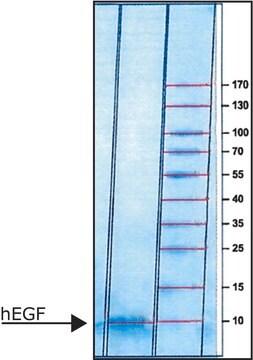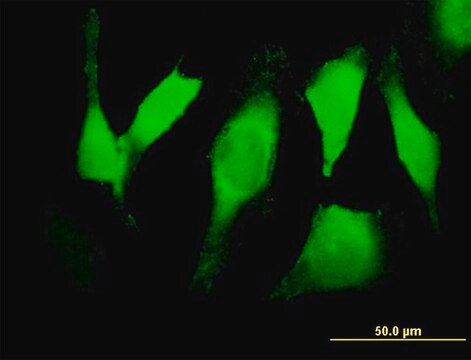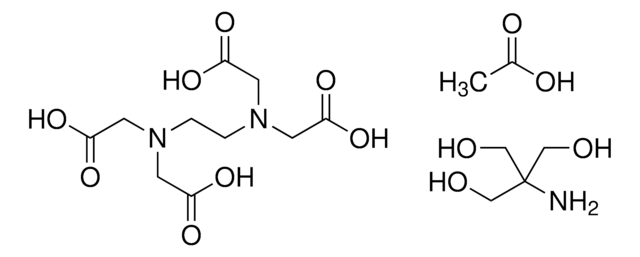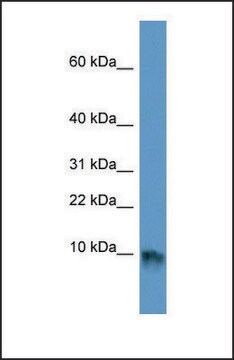推荐产品
生物源
mouse
品質等級
共軛
unconjugated
抗體表格
purified from hybridoma cell culture
抗體產品種類
primary antibodies
無性繁殖
EGF-10, monoclonal
形狀
buffered aqueous solution
分子量
antigen 6 kDa
物種活性
human
技術
dot blot: 0.1 μg/mL using recombinant human EGF
immunohistochemistry (formalin-fixed, paraffin-embedded sections): suitable using human tissue
indirect ELISA: suitable
microarray: suitable
neutralization: suitable
radioimmunoassay: suitable
western blot: suitable
同型
IgG1
UniProt登錄號
應用
research pathology
運輸包裝
dry ice
儲存溫度
−20°C
目標翻譯後修改
unmodified
基因資訊
human ... EGF(1950)
一般說明
Monoclonal Anti-Epidermal Growth Factor (EGF) (mouse IgG1 isotype) is derived from the EGF-10 hybridoma produced by the fusion of mouse myeloma cells and splenocytes from an immunized mouse. Epidermal growth factor (EGF) is a single chain polypeptide hormone (6 kDa). EGF protein exists largely in a β-sheet conformation, with a C-terminal hairpin that may be involved in receptor binding. Human EGF is found in body fluids such as urine, milk, saliva, sweat, and seminal fluid and has its highest concentration in α-granules of blood platelets.
特異性
Specifically reacts with both native and recombinant human EGF. The antibody does not cross-react with mouse EGF.
免疫原
recombinant human EGF
應用
Monoclonal Anti-Epidermal Growth Factor antibody has been used in dot-blot, radioimmunoassay, enzyme linked immunosorbent assay (ELISA), immunohistology, immunoblotting, immunostaining.
Monoclonal Anti-Epidermal Growth Factor antibody produced in mouse was used to study rat immune cells by flow cytometry to detect the presence or absence of hormone and hormone-like molecules in response to EGF treatment.
生化/生理作用
EGFR is a transmembrane glycoprotein that binds to the EGF family. It is a pivotal regulator of cell proliferation, growth, differentiation and DNA repair after radiation-induced damage. Mutations in the gene encoding EGFR are associated with a number of malignancies including lung cancer and colorectal cancer.
Epidermal growth factor (EGF) is a potent growth-promoting factor for a variety of tissue cells in vivo and in vitro. EGF binding induces phosphatidylinositide hydrolysis and generation of diacylglycerol (DAG). Cellular metabolic effects of EGF include stimulation of ion fluxes, glucose transport, glycolysis and synthesis of DNA, RNA and proteins. EGF is mitogenic for a variety of epidermal and epithelial cells, including fibroblasts, glial cells, mammary epithelial cells, vascular and corneal endothelial cells. The biological role of EGF includes the inhibition of gastric acid secretion, support of growth and differentiation during fetal development, neuromodulation in the central nervous system and stimulation of epidermal growth and keratinization.
外觀
Solution in 0.01 M phosphate buffered saline, pH 7.4
免責聲明
Unless otherwise stated in our catalog or other company documentation accompanying the product(s), our products are intended for research use only and are not to be used for any other purpose, which includes but is not limited to, unauthorized commercial uses, in vitro diagnostic uses, ex vivo or in vivo therapeutic uses or any type of consumption or application to humans or animals.
未找到合适的产品?
试试我们的产品选型工具.
儲存類別代碼
10 - Combustible liquids
水污染物質分類(WGK)
WGK 3
閃點(°F)
Not applicable
閃點(°C)
Not applicable
個人防護裝備
Eyeshields, Gloves
ErbB3 is involved in activation of phosphatidylinositol 3-kinase by epidermal growth factor.
Soltoff S P, et al.
Molecular and Cellular Biology, 14(6), 3550-3558 (1994)
Marie McIlroy et al.
Cardiovascular research, 69(1), 207-217 (2005-09-17)
Pericytes, located in close proximity to the underlying endothelium, form an integral component of the microvasculature. These cells are intimately involved in angiogenesis, which is of fundamental importance in many physiological and pathological processes. We evaluated the influence of pericyte-conditioned
Effects of triple treatment with octreotide, galanin and serotonin on a human pancreas cancer cell line in xenografts
El-Salhy M et al.
Histology and Histopathology, 14(6), 3550-3558 (2005)
Epidermal growth factor (EGF) in the human placental infection with Trypanosoma cruzi
Lin S, et al.
Placenta, 25(4), 283-286 (2004)
Trevor Dale et al.
Nature chemical biology, 11(12), 973-980 (2015-10-27)
There is unmet need for chemical tools to explore the role of the Mediator complex in human pathologies ranging from cancer to cardiovascular disease. Here we determine that CCT251545, a small-molecule inhibitor of the WNT pathway discovered through cell-based screening
我们的科学家团队拥有各种研究领域经验,包括生命科学、材料科学、化学合成、色谱、分析及许多其他领域.
联系技术服务部门







